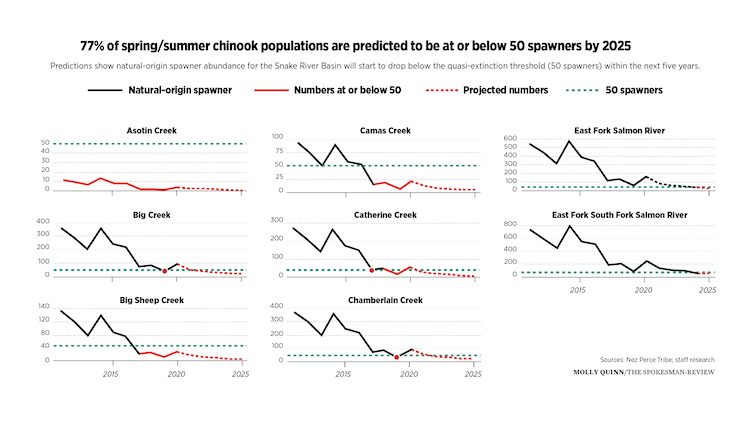forum
library
tutorial
contact

Federal Government Reaches Deal
on Snake River Dams
by Sander Gusinow
Oregon Business, December 15, 2023
|
the film forum library tutorial contact |

|
Federal Government Reaches Deal
by Sander Gusinow
|
The agreement establishes a tribal energy authority to oversee the development of new energy
resources and allocates additional resources to preserve the Snake River salmon populations.
 A deal reached Thursday between the federal government and the parties of a long-brewing lawsuit over four lower Snake River dams creates a new energy program managed by Oregon tribes and includes hundreds of millions of dollars in federal investment in clean energy and salmon conservation.
A deal reached Thursday between the federal government and the parties of a long-brewing lawsuit over four lower Snake River dams creates a new energy program managed by Oregon tribes and includes hundreds of millions of dollars in federal investment in clean energy and salmon conservation.
The deal also places a five-year stay on litigation related to the dams.
The Columbia-Snake River Irrigators Association and the federal government reached the agreement with environmental litigators at EarthJustice, the State of Oregon and Washington, and the Nez Perce, Yakama, Warm Springs and Umatilla Tribes.
The deal establishes the Pacific NW Tribal Energy Program, which allows Oregon tribes to develop, oversee and sell new power resource generation in the region. The BPA's 2.7% rate increase will go toward salmon conservation efforts along the Snake River. A fact sheet from EarthJustice also touts a half-billion dollar commitment from the Biden Administration, much of which will go directly to Oregon tribes to develop clean energy projects.
The Associated Press reported that the Bonneville Power Administration said in the agreement that it will spend $300 million over 10 years to restore fish and other species' habitats in the Columbia River basin, and that it will raise power rates 0.7% to do so.
A press release from Columbia-Snake River Irrigators Association, a defendant-intervener in the proceedings, says the actual cost to Northwest program will cost to power customers will be $100 million per year, "representing about a 2.7% wholesale power rate impact (in review)."
"In its simplest terms, whether people think it's fair or not, the tribes have traded the Lower Snake River breaching for new power resources," said, Darryll Olsen, a board representative with CSRIA. "They effectively become an entity for developers trying to get things built."
The CSRIA's release says the organization supports the agreement means "dam breaching is effectively off the table for any conceivable future." But the suit's plaintiffs, including EarthJustice, say the agreement "sets a path" to breaching the dams. Biden administration officials said Thursday that the president has no intention of taking action on the dams by executive order, and that while the stay is in place, the decision to breach lies solely with Congress.
"The CBRI explicitly calls for the services of the lower Snake River dams to be replaced and then the dams breached within two fish generations (approximately 8 years) to avoid extinction and begin rebuilding salmon populations to healthy and harvestable levels," said a press release issued by EarthJustice Thursday. "The federal commitments do not include a decision to breach the dams, but do include a commitment to begin to replace their services and to work in partnership on next steps."
The plaintiffs advocated for the breaching of the dams to help restore the dwindling salmon populations, in part because of the importance of salmon to Northwest tribes' food sovereignty and religious practices.
"The four Lower Snake River dams must be breached, and commitments to Tribes honored," Sierra Club Snake/Columbia River Salmon campaign director Bill Arthur said in a press release, praising the agreement as a step toward the eventual breaching of the dams. "This agreement moves everyone forward together, with federal resources supporting the replacement of the dam's services. It's both a necessity and an opportunity for our region. We should seize it and work together to ensure it is effectively implemented. We must move forward with the urgency necessary to meet the needs of the salmon, orca and communities and tribes that depend on them."
Olsen pointed to Washington-based Energy Northwest as a potential developer of nuclear energy projects in the region. He says anyone looking to develop new energy projects will need to "become friendly" with the new Tribal Energy Program if they want their energy project developed, since he says the federal government fast-tracks tribal projects.
Olsen says he has been working through this litigation since the first lawsuit against the Snake River dams was filed in 1992. He says the agreement marks the end of a 30-year court battle, and that the door is still open to breaching the dams in five years when the agreement is up for renewal, and then in 10 years when the agreement expires.
"It's providing value, and after five years, the plaintiffs could literally say, 'We don't like it, let's call the judge and get this done,'" Olsen says.
The agreement now heads to U.S. District Federal Judge Michael Simon for final approval.
learn more on topics covered in the film
see the video
read the script
learn the songs
discussion forum
